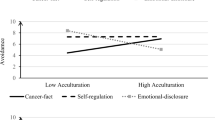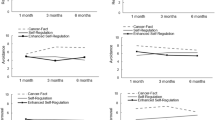Abstract
Emotional expression and cognitive efforts to adapt to cancer have been linked to better psychological adjustment. However, little is known about the relationship between linguistic indicators of emotional and cognitive coping efforts and corresponding self-report measures of related constructs. In this study, we sought to evaluate the interrelationships between self-reports of emotional suppression and linguistic indicators of emotional and cognitive coping efforts in those living with cancer. Seventy-one individuals attending a community cancer support group completed measures of emotional suppression and mood disturbance and provided a written narrative describing their cancer experience. Self-reports of emotional suppression were associated with more rather than less distress. Although linguistic indicators of both emotional expression and cognitive processing were generally uncorrelated with self-report measures of emotional suppression and mood disturbance, a significant interaction was observed between emotional suppression and use of cognitive words on mood disturbance. Among those using higher levels of emotional suppression, increasing use of cognitive words was associated with greater levels of mood disturbance. These findings have implications for a) the therapeutic use of emotion in psychosocial interventions and b) the use of computer-assisted technologies to conduct content analysis.

Similar content being viewed by others
References
Alpers, G. W., Winzelberg, A. J., Classen, C., Roberts, H., Dev, P., Koopman, C., and Taylor, C. B. (2005). Evaluation of computerized text analysis in an Internet breast cancer support group. Comp. Human Behav. 21: 343–358.
Cassileth, B. R., Lusk, E. J., Brown, L. L., and Cross, P. A. (1985). Psychosocial status of cancer patients and next of kin: Normative data from the Profile of Mood States. J. Psychosoc. Oncol. 3: 99–105.
Cella, D. F., Tross, S., and Orav, E. J. (1989). Mood states of patients after the diagnosis of cancer. J. Psychosoc. Oncol. 7: 45–54.
Classen, C., Koopman, C., Angell, K., and Spiegel, D. (1996). Coping styles associated with psychological adjustment to advanced breast cancer. Health Psychol. 15: 434–437.
Classen, C., Butler, L. D., Koopman, C., Miller, E., DiMiceli, S., Giese-Davis, J., et al. (2001). Supportive-expressive group therapy reduces distress in metastatic breast cancer patients: A randomized clinical intervention trial. Arch. Gen. Psychiat. 58: 494–501.
Cohen, J., Cohen, P., West, S. G., and Aiken, L. S. (2003). Applied multiple regression/correlation analysis for the behavioral sciences (3rd ed.) Lawrence Erlbaum Associates: Mahwah, NJ.
Cohn, M. A., Mehl, M. R., and Pennebaker, J. W. (2004). Linguistic markers of psychological change surrounding September 11, 2001. Psychol. Sci. 15: 687–693.
Cordova, M. J., Giese-Davis, J., Golant, M., Kronnenwetter, C., Chang, V., McFarline, S., et al. (2003). Mood disturbance in community cancer support groups: The role of emotional suppression and fighting spirit. J. Psychosom. Res. 55: 461–467.
Creamer, M., Burgess, P., and Pattison, P. (1992). Reactions to trauma: A cognitive processing model. J. Abnorm. Psychol. 101: 452–459.
Esterling, B. A., L’Abate, L., Murray, E. J., and Pennebaker, J. W. (1999). Empirical foundations for writing in prevention and psychotherapy: Mental and physical health outcomes. Clinical Psychol. Rev. 19: 79–96.
Fobair, P., Koopman, C., Dimiceli, S., O’Hanlan, K., Butler, L. D., Classen, C., Drooker, N., Davids, H. R., Loulan, J., Wallsten, D., and Spiegel, D. (2002). Psychosocial intervention for lesbians with primary breast cancer. Psycho. Oncol. 11: 427–438.
Folkman, S., and Greer, S. (2000). Promoting psychological well-being in the face of serious illness: When theory, research and practice inform each other. Psycho. Oncol. 9: 11–19.
Giese-Davis, J., Koopman, C., Butler, L. D., Classen, C., Cordova, M., Fobair, P., Benson, J., Kraemer, H. C., and Spiegel, D. (2002). Change in emotion-regulation strategy for women with metastatic breast cancer following supportive-expressive group therapy. J. Consult. Clin. Psychol. 70: 916–925.
Giese-Davis, J., Koopman, C., Butler, L. D., Joss, J., Classen, C., Roberts, J., Rosenbluth, R., Morrow, G. R., and Spiegel, D. (2004). The Stanford Emotional Self-Efficacy Scale–Cancer: Reliability, validity, and generalizability. In Nyklícek, I., Temoshok, L., and Vingerhoets, A. (Eds.), Emotional expression and health: advances in theory, assessment and clinical applications: Hove (pp. 204–222). UK and New York; Brunner-Routledge.
Giese-Davis, J., Piemme, K. A., Dillon, C., and Twirbutt, S. (2005). Macro-variables in affective expression in women with breast cancer participating in support groups. In Harrigan, J., Scherer, K. R., and Rosenthal, R. (Eds.), Nonverbal behavior in the affective sciences: A handbook of research methods (pp. 399–445). Oxford: Oxford University Press.
Giese-Davis, J., and Spiegel, D. (2003). Emotional expression and cancer progression. In Davidson, R. J., Scherer, K. R., and Hill Goldsmith, H. (Eds.), Handbook of affective sciences (pp. 1053–1082). Oxford: Oxford University Press.
Greenberg, L. S., Rice, L. N., and Elliott, R. (1993). Facilitating emotional change: The moment-by-moment process. New York: The Guilford Press.
Gross, J. (1989). Emotional expression in cancer onset and progression. Soc. Sci. Med. 28: 1239–1248.
Ho, S. M., Chan, C. L. W., and Ho, R. T. H. (2004). Posttraumatic growth in Chinese cancer survivors. Psycho. Oncol. 13: 377–389.
Horowitz, M. J. (1997). Stress response syndromes (3rd ed.). New York: Aronson.
Izard, C. E. (2001). Emotional intelligence of adaptive emotions? Emotion 1: 249–257.
Katz, R. C., Flasher, L., Cacciapaglia, H., and Nelson, S. (2001). The psychosocial impact of cancer and lupus: A cross-validational study that extends the generality of “benefit-finding” in patients with chronic disease. J. Behav. Med. 24: 561–571.
Klemm, P., Hurst, M., Dearholt, S. L., and Trone, S. R. (1999). Gender differences on Internet cancer support groups. Comp. Nurs. 17: 65–72.
Kraemer, H. C., and Blasey, C. M. (2004). Centring in regression analyses: A strategy to prevent errors in statistical inference. Int. J. Meth. Psychiat. Res. 13(3): 141–151.
Kring, A. M., Smith, D. A., and Neale, J. M. (1994). Individual differences in dispositional expressiveness: Development and validation of the Emotional Expressivity Scale. J. Pers. Soc. Psychol. 66: 934–949.
Krippendorf, K. (2004). Content analysis. Thousand Oaks, CA: Sage Publications.
Lazarus, R. S., and Folkman, S. (1984). Stress, appraisal, and coping. New York: Springer.
Low, C. A., Stanton, A. L., and Danoff-Burg, S. (2006). Expressive disclosure and benefit-finding among breast cancer patients: Mechanisms for positive health effects. Health Psychol. 25: 181–189.
Manne, S., Ostroff, J., Winkel, G., Goldstein, L., Fox, K., and Grana, G. (2004). Posttraumatic growth after breast cancer: Patient, partner, and couple perspectives. Psychosom. Med. 66: 442–454.
McNair, D. M., Lorr, M., and Droppleman, L. F. (1992). Edits manual for the Profile of Mood States. San Diego: Educational and Industrial Testing Service.
Owen, J. E., Klapow, J. C., Roth, D. L., and Tucker, D. C. (2004). Use of the internet for information and support: Disclosure among persons with breast and prostate cancer. J. Behav. Med. 27: 491–505.
Pennebaker, J. W., and Francis, M. E. (1999). Linguistic Inquiry and Word Count. Mahwah, NJ: Erlbaum.
Pennebaker, J. W., and King, L. A. (1999). Linguistic styles: Language use as an individual difference. J. Pers. Soc. Psychol. 77: 1296–1312.
Schmidt, J. E., and Andrykowski, M. A. (2004). The role of social and dispositional variables associated with emotional processing in adjustment to breast cancer: An internet-based study. Health Psychol. 23: 249–266.
Stanton, A. L., Danoff-Burg, S., Cameron, C. L., Bishop, M., Collins, C. A., Kirk, S. B., Sworowski, L. A., and Twillman, R. (2000). Emotionally expressive coping predicts psychological and physical adjustment to breast cancer. J. Consult. Clin. Psychol. 68: 875–882.
Stanton, A. L., Danoff-Burg, S., Sworowski, L. A., Collins, C. A., Branstetter, A. D., Rodriguez-Hanley, A., Kirk, S. B., and Austenfeld, J. L. (2002). Randomized, controlled trial of written emotional expression and benefit finding in breast cancer. J. Clin. Oncol. 20: 4160–4168.
Stemler, S. (2001). An overview of content analysis. Prac. Assess. Res. Eval. 7: 17.
Temoshok, L. (1987). Personality, coping style, emotion, and cancer: Towards an integrative model. Can. Surv. 6: 545– 567.
Trierweiler, L. I., Eid, M., and Lischetzke, T. (2002). The structure of emotional expressivity: Each emotion counts. J. Pers. Soc. Psychol. 82: 1023–1040.
Urcuyo, K. R., Boyers, A. E., Carver, C. S., and Antoni, M. H. (2005). Finding benefit in breast cancer: Relations with personality, coping, and concurrent well-being. Psychol. Health 20: 175–192.
Watson, M., and Greer, S. (1983). Development of a questionnaire measure of emotional control. J. Psychosom. Res. 27: 299–305.
Weihs, K. L., Enright, T. M., Simmens, S. J., and Reiss, D. (2000). Negative affectivity, restriction of emotions, and site of metastases predict mortality in recurrent breast cancer. J. Psychosom. Res. 49: 59–68.
Zakowski, S. G., Ramati, A., Morton, C., Johnson, P., and Flanigan, R. (2004). Written emotional disclosure buffers the effects of social constraints on distress among cancer patients. Health Psychol. 23: 555–563.
ACKNOWLEDGEMENTS
Carol Kronenwetter, Ph.D. now at California Pacific Medical Center, San Francisco. This research was funded by California Breast Cancer Research Program grants #1FB-0383, #4BB-2901, and #5FB-0036, the John D. and Catherine T. MacArthur Foundation, and the Kozmetsky Global Collaboratory, Stanford. Parts of this analysis were presented at the Annual meeting for the Society of Behavioral Medicine, 2000, in Nashville, TN. We would like to acknowledge the contributions of Michael States from TWC, research assistants Casey Alt, Sanjay Chakrapani, Barbara K. Symons, and Rebecca Caldwell, and the efforts of data manager Sue DiMiceli. We would also like to acknowledge the contributions of the many men and women who participated.
Author information
Authors and Affiliations
Corresponding author
Rights and permissions
About this article
Cite this article
Owen, J.E., Giese-Davis, J., Cordova, M. et al. Self-Report and Linguistic Indicators of Emotional Expression in Narratives as Predictors of Adjustment to Cancer. J Behav Med 29, 335–345 (2006). https://doi.org/10.1007/s10865-006-9061-8
Accepted:
Published:
Issue Date:
DOI: https://doi.org/10.1007/s10865-006-9061-8




